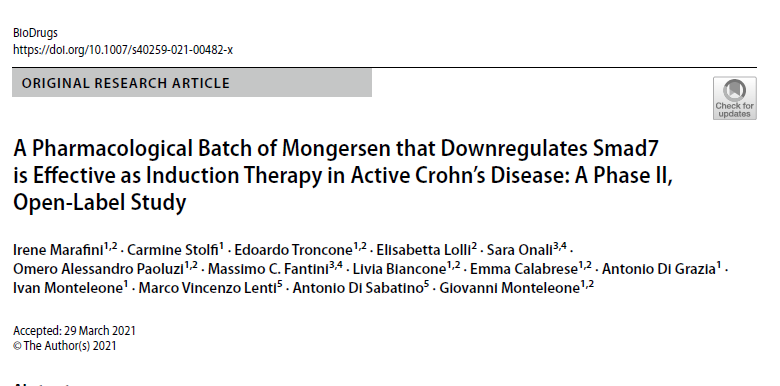Nogra Pharma is available to give comprehensive Project presentations, provide additional Project specific details or confidential information and discuss potential collaborations or out-licensing opportunities with interested companies.

Abstract
Background
A recent phase III trial did not confirm the previous clinical and endoscopic improvements seen in patients with Crohn’s disease (CD) receiving Mongersen, an oral Smad7 antisense oligonucleotide. Factors accounting for such a discrepancy are unknown.
Objective
Our objective was to further assess whether Mongersen was effective as induction therapy in active CD and evaluate the in vitro inhibitory effect of various batches of Mongersen used in the previous and present trials on Smad7 expression.
Methods
In a phase II, open-label study, 18 patients with active CD (Crohn’s Disease Activity Index [CDAI] score > 220 and evidence of endoscopic lesions) received Mongersen 160 mg/day for 12 weeks. The rates of clinical remission, defined as CDAI < 150, and clinical response, defined as a CDAI score decrease ≥ 100, were evaluated at week 4, 8, and 12. The fraction of circulating CCR9-expressing leukocytes was assessed by flow cytometry. Smad7 expression was evaluated in the human colorectal cancer cell line HCT-116 transfected with different batches of Mongersen using real-time polymerase chain reaction (PCR) and Western blotting,
Results
The proportions of patients experiencing clinical remission were 38.9%, 55.6%, and 50.0% at week 4, 8, and 12, respectively. At the same time points, the rates of clinical response were 72.2%, 77.8%, and 77.8%, respectively. Mongersen reduced the percentages of CCR9-expressing CD45+ cells. The batch of Mongersen used in this study, but not two batches used in the phase III study, inhibited Smad7 expression in HCT-116 cells.
Conclusions
The present findings support the clinical benefit of Mongersen in active CD and show that various batches manufactured during the GED0301 program differ in their ability to inhibit in vitro Smad7.
